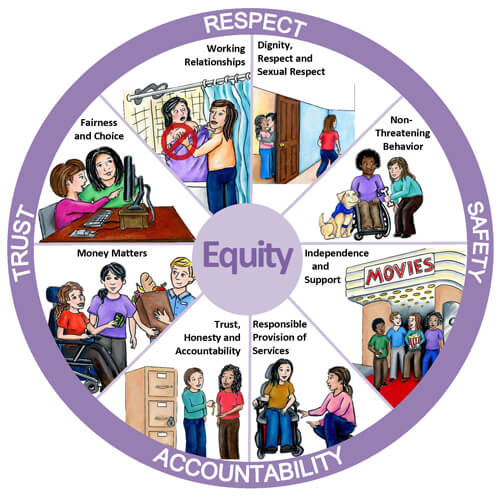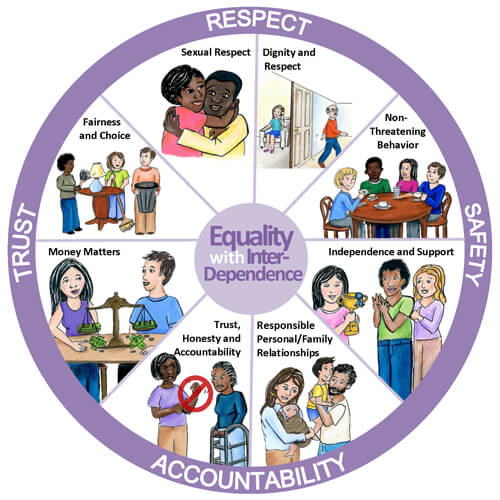#ProjectPeerToo, originally known as Project Peer, is a DC-based collaboration committed to person-centered, trauma-informed supports for District residents with intellectual and developmental disabilities (IDD) who are survivors of sexual assault.
Women and men with disabilities, especially people with intellectual and developmental disabilities, are among the populations most vulnerable to sexual violence. Multiple studies highlight the increased risk, frequency, and duration of abuse they experience at the hands of intimate partners, family members, and/or caregivers, including transportation providers.
#ProjectPeerToo sees the needs of survivors of sexual violence with IDD through an intersectional, anti-racist, anti-oppressive, trauma-informed lens. That means we recognize that each aspect of a person’s unique identity – including but not limited to race, class, gender, sexuality, ethnicity, age, disability, and survivor status – is interconnected and involves its own structures of power, privilege, and marginalization. Together, we respond to each person’s unique identity. We use this framework throughout our project planning, implementation, and evaluation.
#ProjectPeerToo Mission and Vision
The Mission of #ProjectPeerToo is to:
- Bring awareness to the intersection of IDD, sexual violence, and sexuality
- Explore how existing systems succeed or fail survivors of sexual violence with IDD and drive changes, where needed
- Provide information and support about sexual violence and consent, safe sexual practices, healthy relationships, and sexual identity to people with IDD
- Provide information and support about working with people with IDD to the people who assist survivors of sexual violence
#Project Peer Too’s Vision: In the District of Columbia, survivors of sexual assault or abuse who have disabilities will live in safe environments, heal and have healthy, successful lives. Survivors will have access to high-quality, seamless supports that are person-centered, trauma-informed, and responsive to each survivor’s needs.
#ProjectPeerToo Collaboration Partners
DC Department on Disability Services (DDS)
DC Rape Crisis Center (DCRCC)
Project ACTION!
Quality Trust for Individuals with Disabilities
History of Project Peer and Our Work
Project Peer was first funded in 2007 with support from the US Department of Justice Office on Violence Against Women (OVW). Project Peer was a collaboration of eight anti-violence and disability support organizations seeking to improve services for women with developmental disabilities and/or mental health issues who had experienced or been threatened with domestic violence or sexual assault. The partners included Anchor Mental Health, DC Coalition Against Domestic Violence, DC Rape Crisis Center, Lt. Joseph P. Kennedy Institute, Project ACTION!, Quality Trust for Individuals with Disabilities, Ramona’s Way, and The Resource Opportunity Center.
Project Peer developed various resources and tools including a training for professional staff that support survivors, a comprehensive training curriculum to educate women with disabilities about domestic and sexual violence, and educational graphics to help explain different types of violence in plain language and with accessible images.

Click Here to view the Healthy Relationships Wheels with text

Click Here to view the Equality with Inter-Dependence wheels with text

Click Here to view the Power and Control wheels with text
All training has been paused while #ProjectPeerToo takes time to review, update, and create new resources. We hope to offer new training opportunities and educational resources soon.
For more information about #ProjectPeerToo, please contact us at info@dcqualitytrust.org or 202-448-1450.
If you are the victim of sexual assault and need support services, please call DC Rape Crisis Center’s anonymous and confidential crisis hotline at 202-333-7273.
